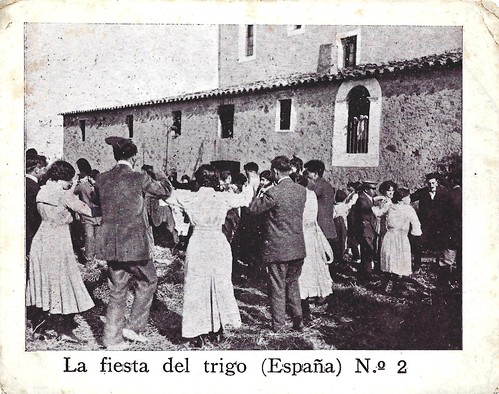
Spanish collector card by Reclam Films, Mallorca, no. 1 of 6. Scene from La festa del blat/La fiesta del trigo/The Wheat Festival (Josep de Togores i Muntades, Joan Solà i Mestres, 1914) Photo: Cóndor Films, Barcelona.

Spanish collector card by Reclam Films, Mallorca, no. 2 of 6. Scene from La festa del blat/La fiesta del trigo/The Wheat Festival (Josep de Togores i Muntades, Joan Solà i Mestres, 1914) Photo: Cóndor Films, Barcelona.

Spanish collector card by Reclam Films, Mallorca, no. 3 of 6. Scene from La festa del blat/La fiesta del trigo/The Wheat Festival (Josep de Togores i Muntades, Joan Solà i Mestres, 1914) Photo: Cóndor Films, Barcelona.
Film pioneer Josep de Togores
Film director Josep de Togores i Muntades (1868-1926) or José de Togores is now best remembered as a Spanish football executive. He was the second president of the Catalan Football Federation (1904–1905) and co-founder of the sports magazine Mundo Deportivo (1906). Togores was a man of wide culture, and as such, in addition to sports, he was also interested in music and was a friend and host to Camille Saint-Saëns and Spanish composer Enric Granados, with whom he organised concerts at his home. He also collected art and painted as a hobby.
His income began to dwindle in the early 1910s, and he went bankrupt after several unsuccessful businesses. Togores saw in the world of cinema and filmmaking, a path that fitted his personality. His first film was La festa del blat/La fiesta del trigo/The Wheat Festival (Josep de Togores i Muntades, Joan Solà i Mestres, 1914), based on a play by Àngel Guimerà and produced by Condor Films.
La festa del blat/La fiesta del trigo/The Wheat Festival (Josep de Togores i Muntades, Joan Solà i Mestres, 1914) tells the tale of Jaume, a young worker, who flees to the mountains to avoid being arrested. On the day of the Wheat Festival, the betrothed Oriola, a rich heiress, and Vicentó pick up an exhausted Jaume in the middle of the road. He goes to work at the girl's uncle's farmhouse. Vicentó, jealous of the love between Jaume and his fiancee, denounces him. Jaume tries to prevent the workers from attacking Vicentó. He is mortally wounded and dies in Oriola's arms. The premiere of La festa del blat was attended by author Àngel Guimerà himself, who praised Togores's work.
Togores's film debut was followed by Dansa fatal/Fatal Dance (Josep de Togores, 1914), El pollo Tejada/Chicken Tejada (Josep de Togores, 1915), with a plot inspired by the homonymous zarzuela by Carlos Arniches. With the rising production costs of his films, he began to work with Segre Films. Under this production company, Togores directed eight films. In the film El cuervo del campamento/The Camp Crow (Fructuós Gelabert, Josep de Togores, 1915) he shared the direction with Fructuós Gelabert. Amor de pescadora/Fisherwoman's Love (Josep de Togores, 1915) features the performance of renowned artists, but it was Un sólo corazó/A Single Heart (1915), that made the biggest impression and was consecrated as the best Spanish film till then. In articles, Togores expressed the great opportunity that Spanish cinema had during the First World War while there was a lack of foreign films. The last major production of Togores for Segre was El sello de oro/The Golden Seal (Josep de Togores, 1916), starring Stacia Napierkowska.
He continued with Flor del arroyo, Secrets del mar/Flower of the Stream, Secrets of the Sea (Josep de Togores, 1916), and in the following years, he made the serial Prova tràgica/Tragic Test (Josep de Togores, 1916?), Un drama a la muntanya/A mountain drama (Josep de Togores, 1916?), La pescadora de Tossa/The fisherwoman of Tossa (Josep de Togores, 1916?), El cavaller Casaroja/The Cavalier Casaroja (Josep de Togores, 1916?), El regal de bodes/The Wedding Gift (Josep de Togores, 1916?), and El golfo (Josep de Togores, 1917-1919) with Ernesto Vilches, which was filmed in Bilbao and San Sebastián, for the Madrid production company Dessy Films. His films were considered of high quality, with good technical collaborators, ambitious and extensive themes, lavish presentation, and featuring great actors and actresses such as Fernando Díaz de Mendoza, María Guerrero, Lola París, and Pastora Imperio. His style was classified as drama a la Italiana, and this conception increased with the addition of Giovanni Doria to his work team.
Josep de Togores Muntades tried to capture his audience with a theatrical style even when it approached realism. Although his films were dynamic, the public found them too theatrical, and their themes were artificial and not very cinematic. After directing sixteen films, the film world had brought him more difficulties than financial benefits to his family. Togores' economic situation was precarious, so he decided to meet his son, artist Josep Togores i Llach in Paris. There he focused on promoting the career of his son and he became an important art collector. He devoted the last years of his life to promoting the work of his son. There are very few studies of the work of Josep de Togores Muntades. Two of his films, El pollo de Tejada (1915) and El Golfo (1917-1919), have been restored.

Spanish collector card by Reclam Films, Mallorca, no. 4 of 6. Scene from La festa del blat/La fiesta del trigo/The Wheat Festival (Josep de Togores i Muntades, Joan Solà i Mestres, 1914) Photo: Cóndor Films, Barcelona.

Spanish collector card by Reclam Films, Mallorca, no. 5 of 6. Scene from La festa del blat/La fiesta del trigo/The Wheat Festival (Josep de Togores i Muntades, Joan Solà i Mestres, 1914) Photo: Cóndor Films, Barcelona.

Spanish collector card by Reclam Films, Mallorca, no. 6 of 6. Scene from La festa del blat/La fiesta del trigo/The Wheat Festival (Josep de Togores i Muntades, Joan Solà i Mestres, 1914) Photo: Cóndor Films, Barcelona.
Sources: Cervantes Virtual (Spanish), Real Academia de la Historia (Spanish), Wikipedia and IMDb.
No comments:
Post a Comment